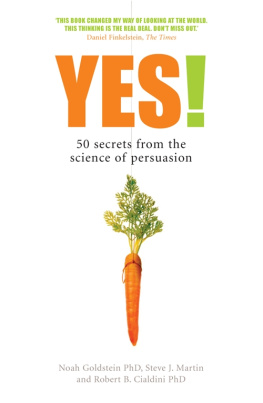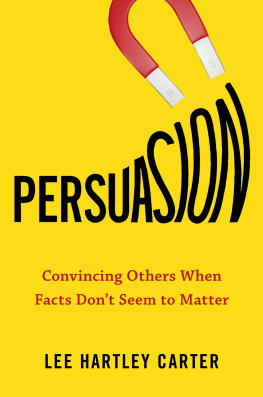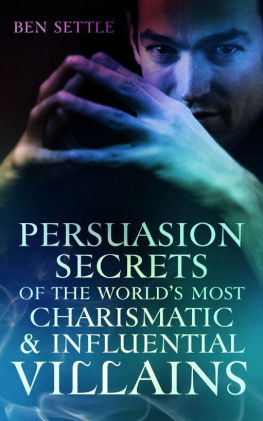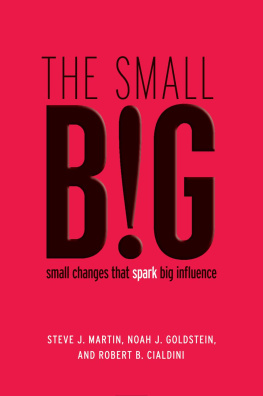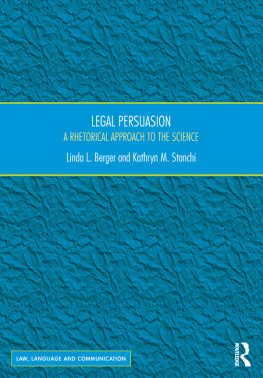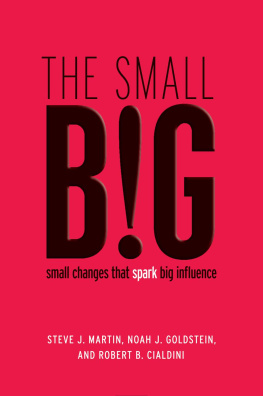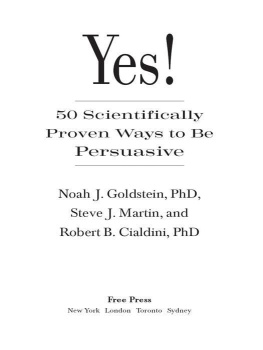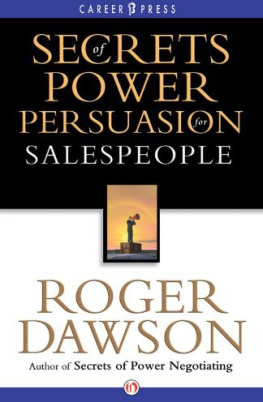Noah Goldstein - Yes!: 50 secrets from the science of persuasion
Here you can read online Noah Goldstein - Yes!: 50 secrets from the science of persuasion full text of the book (entire story) in english for free. Download pdf and epub, get meaning, cover and reviews about this ebook. year: 2007, publisher: Profile Books, genre: Politics. Description of the work, (preface) as well as reviews are available. Best literature library LitArk.com created for fans of good reading and offers a wide selection of genres:
Romance novel
Science fiction
Adventure
Detective
Science
History
Home and family
Prose
Art
Politics
Computer
Non-fiction
Religion
Business
Children
Humor
Choose a favorite category and find really read worthwhile books. Enjoy immersion in the world of imagination, feel the emotions of the characters or learn something new for yourself, make an fascinating discovery.
- Book:Yes!: 50 secrets from the science of persuasion
- Author:
- Publisher:Profile Books
- Genre:
- Year:2007
- Rating:3 / 5
- Favourites:Add to favourites
- Your mark:
- 60
- 1
- 2
- 3
- 4
- 5
Yes!: 50 secrets from the science of persuasion: summary, description and annotation
We offer to read an annotation, description, summary or preface (depends on what the author of the book "Yes!: 50 secrets from the science of persuasion" wrote himself). If you haven't found the necessary information about the book — write in the comments, we will try to find it.
Yes!: 50 secrets from the science of persuasion — read online for free the complete book (whole text) full work
Below is the text of the book, divided by pages. System saving the place of the last page read, allows you to conveniently read the book "Yes!: 50 secrets from the science of persuasion" online for free, without having to search again every time where you left off. Put a bookmark, and you can go to the page where you finished reading at any time.
Font size:
Interval:
Bookmark:

Surprising, provocative, fun Tim Harford, author of The Undercover Economist
Are there any nice little books I could buy as a present that wouldnt insult the recipients intelligence? Yes. Or rather Yes!Guardian
All the tips for getting a yes are inventive and intriguing Independent
The book is a treasure trove of information Yes! is a fascinating read and offers countless insights into the way consumers behave. The perfect Christmas present for any business man or woman Business Life
Jedi-like an entertaining guide to 50 tried and tested methods of persuasion Esquire
Rather a good read ... earnest and honest Evening Standard
You should read this book. You should read it because youll enjoy it; because its perfectly pitched for smart businesspeople; because its easy to dip into while waiting for a colleague or a plane; and because if you dont someone else is going to get one over you ... Charmingly practical ... the punchy, eager prose keeps things ticking along Octavius Black, co-author of The Mind Gym
Entertaining, eye-opening its all good stuff and very well presented Spiked.com
Serves up plenty of weird and wonderful case histories Sunday Express
About the authors
Dr Noah J. Goldstein is a faculty member at the Anderson School of Management at UCLA, California. His scholarly research and writing have been published in many of the premier psychology and business journals, and he has been awarded research fellowships and grants from several US government institutions, including the National Science Foundation and the National Institutes of Health. He has also consulted for a number of corporate and government organisations, including Accenture, the United States Forest Service, and the United States Census Bureau
Steve J. Martin is the Director of Influence At Work (UK). He has a background in sales and marketing and has written numerous articles that have been featured in a variety of business publications and the national press. He is a columnist for the British Airways in-flight magazine Business Life and also writes for the Institute of Leadership and Management. He speaks at conferences all over the world and regularly presents on the subject of influence and persuasion at a number of business schools, including Cranfield University and the Cass London Business School.
Dr Robert B. Cialdini is Regents Professor of Psychology and Marketing at Arizona State University. He is the worlds most quoted expert in the field of influence and persuasion and the author of the groundbreaking book Influence: Science and Practice, which has sold over one million copies. His research appears in a wide range of academic and business journals and has attracted the attention of businesses and governments alike. In 2003, he was awarded the Donald T. Campbell Award for his distinguished contribution to the field of social psychology.
YES!
50 secrets from the science
of persuasion
Noah J. Goldstein PhD, Steve J. Martin
and Robert B. Cialdini PhD

For my parents and, of course, for Jenessa NJG
For my niece and nephew Casie Leigh and Riley SJM
For my granddaughter Hailey Brooke Cialdini RBC
First published in Great Britain in 2007 by
PROFILE BOOKS LTD
3A Exmouth House
Pine Street
London EC1R 0JH
www.profilebooks.com
This eBook edition published in 2009
Copyright Noah J. Goldstein, Steve J. Martin and Robert B. Cialdini, 2007The moral right of the authors has been asserted.
Text design by Sue Lamble
Typeset by MacGuru Ltd
This eBook is copyright material and must not be copied, reproduced,transferred, distributed, leased, licensed or publicly performed or used inany way except as specifically permitted in writing by the publishers, asallowed under the terms and conditions under which it was purchased or asstrictly permitted by applicable copyright law. Any unauthoriseddistribution or use of this text may be a direct infringement of the authorsand publishers rights and those responsible may be liable in law accordingly.
A CIP catalogue record for this book is available from the British Library.
eISBN: 978-1-847-65132-7
Contents
If all the worlds a stage, then small changes in your lines can have dramatic effects
Theres an old joke that the comedian Henny Youngman would tell about his previous nights accommodation: What a hotel! The towels were so big and fluffy that I could hardly close my suitcase.
Over the last few years, however, the moral dilemma facing hotel guests has changed. These days, the question of whether to remove the towels from their room has been replaced by the question of whether or not to reuse the towels during the course of their stay. With the increasing adoption by hotels of environmental programmes, more and more travellers are being asked to reuse their towels, to help conserve resources, save energy and reduce the amount of detergent-related pollutants released into the environment. In most cases, this request comes in the form of a card placed in guests bathrooms.
These cards provide remarkable insights into the often secret science of persuasion.
With a nearly limitless array of angles to play and motivational strings to pull, what words should be put on the card to make the request most persuasive to the hotel guests? Before providing an answer, which well do in the first two chapters, lets first ask how the designers of the messages on these little cards typically encourage guests to participate in these programmes. A survey of the messages conveyed by dozens of request cards from a wide variety of hotels around the globe reveals that these cards most commonly attempt to encourage towel recycling efforts by focusing guests almost exclusively on the importance of environmental protection. Guests are almost invariably informed that reusing their towels will conserve natural resources and help spare the environment from further depletion and disruption. This information is often accompanied by eye-catching environment-related pictures, ranging from rainbows to raindrops to rainforests to reindeer, even.
This persuasion strategy generally seems to be an effective one. For example, one of the largest manufacturers of these signs reports that most hotel guests who have the chance to take part in these programmes do reuse their towels at least once during their stay. The level of participation produced by these signs can be seen as impressive.
Social psychologists, however, are often on the lookout for ways to apply their scientific knowledge to make policies and practices even more effective. Much like a roadside billboard that reads Place your ad here, these little towel recycling cards spoke to us, practically begging us to Test your ideas here. So we did. And, as well explain, we showed that by making a small change to the way the request is made, hotel chains can do much, much better.
Of course, how, precisely, one could go about enhancing the effectiveness of these types of environmental campaign is but a single issue. Much more broadly, were going to claim that everyones ability to persuade others can be enhanced by learning persuasion strategies that have been scientifically proved to be successful. As this book will reveal, small, easy changes to our messages can make them vastly more persuasive. We will report on dozens of studies, some conducted by us, some by other scientists, that demonstrate this point in many different settings. Along the way, we will discuss the principles behind these findings. Our central purpose is to provide the reader with a better understanding of the psychological processes underlying how we can influence others to move their attitudes or behaviour in a direction that results in positive outcomes for both parties. As well as presenting a variety of effective and ethical persuasion strategies, we discuss the types of things to watch out for to help you resist both subtle and overt influences on your decision-making.
Font size:
Interval:
Bookmark:
Similar books «Yes!: 50 secrets from the science of persuasion»
Look at similar books to Yes!: 50 secrets from the science of persuasion. We have selected literature similar in name and meaning in the hope of providing readers with more options to find new, interesting, not yet read works.
Discussion, reviews of the book Yes!: 50 secrets from the science of persuasion and just readers' own opinions. Leave your comments, write what you think about the work, its meaning or the main characters. Specify what exactly you liked and what you didn't like, and why you think so.

